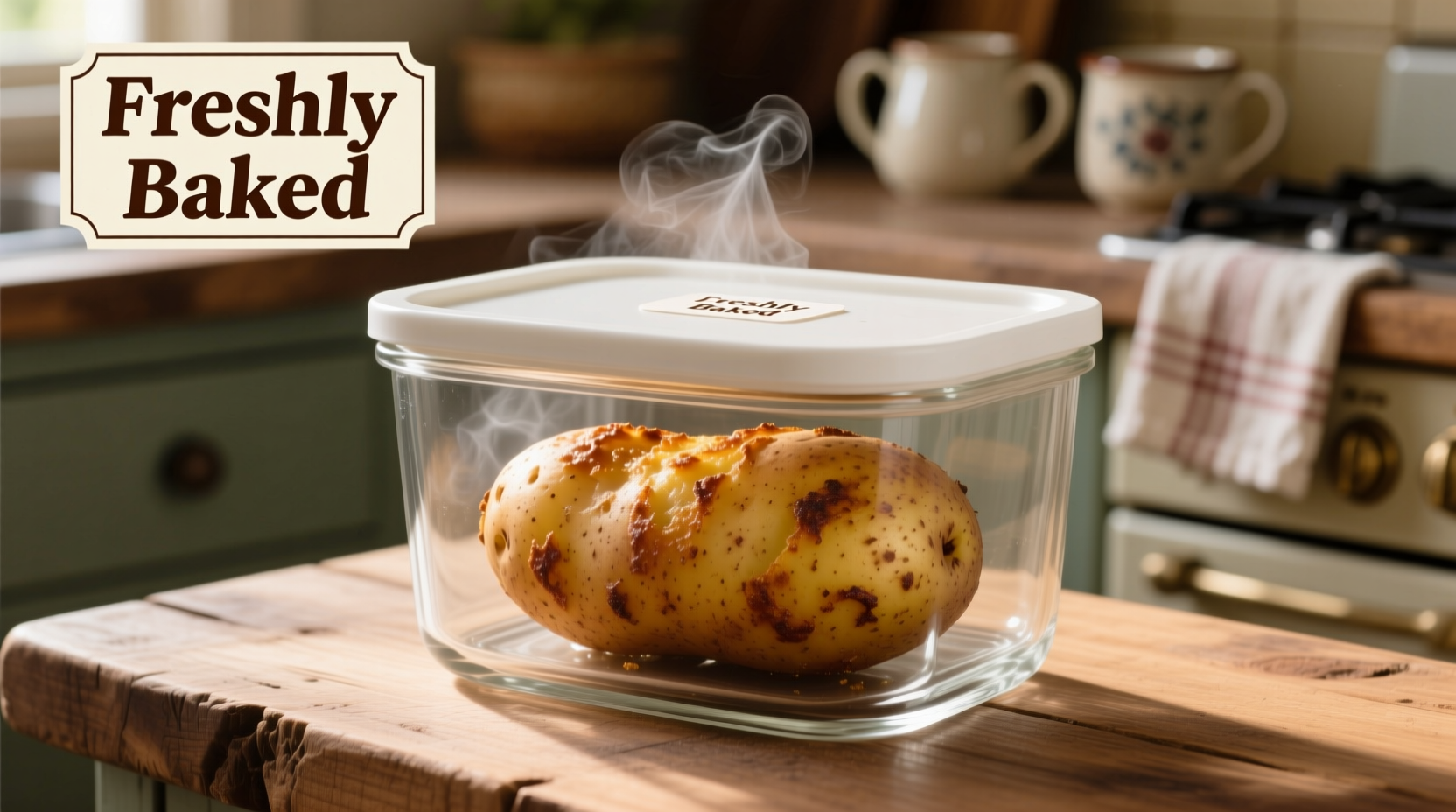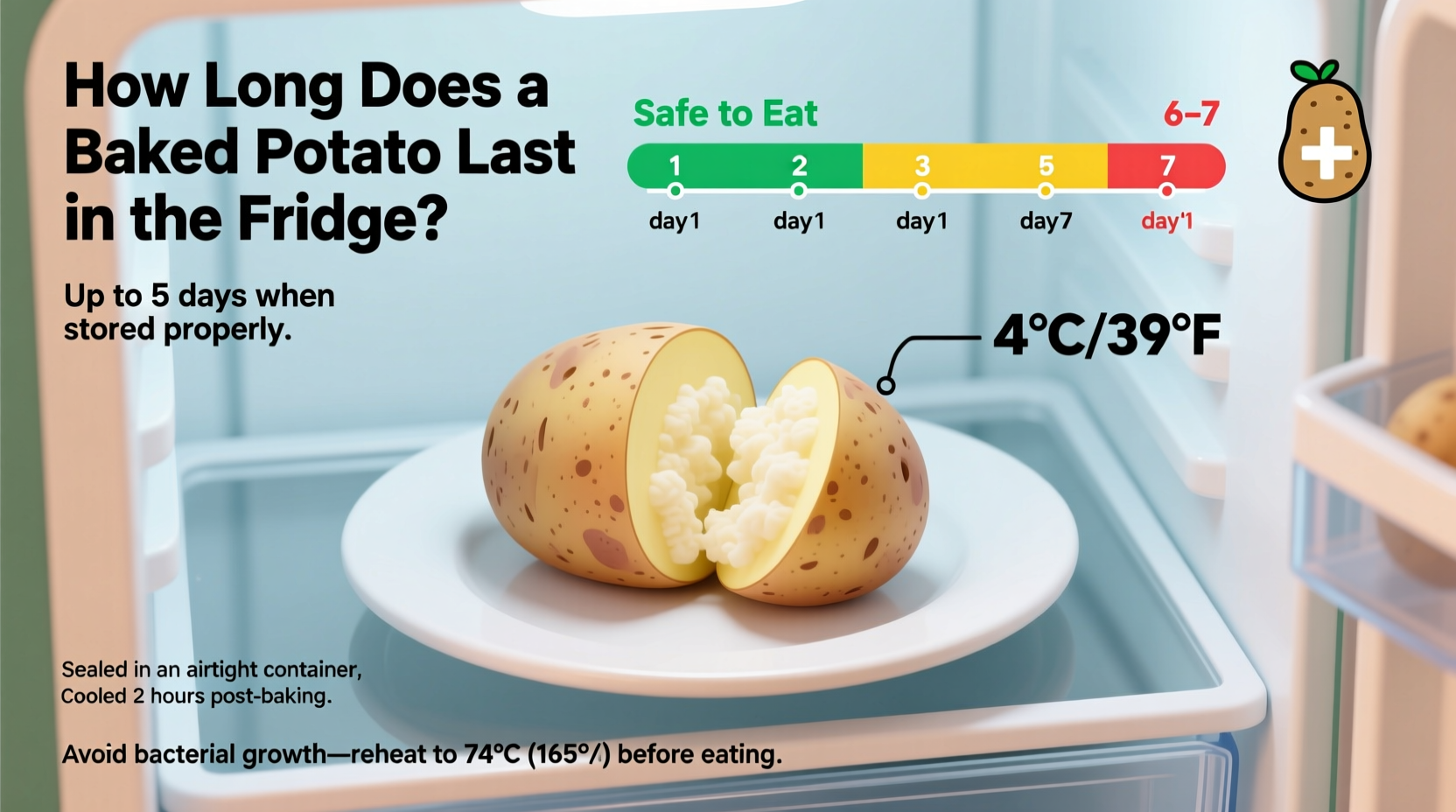Ever pulled a forgotten baked potato from the back of your fridge and wondered if it's still safe to eat? You're not alone. Food safety with cooked potatoes is more nuanced than many realize, and improper storage can lead to serious health risks. Let's break down exactly how long your baked potato lasts in the fridge and, more importantly, how to store it properly to maximize both safety and quality.
The Critical First Hour: Cooling Your Baked Potato Safely
What happens in the first 60 minutes after baking determines your potato's entire shelf life. Unlike many cooked foods, baked potatoes present a unique food safety concern due to Clostridium botulinum bacteria, which thrives in low-oxygen, warm environments.
According to the FDA Food Code, cooked potatoes should move from the "danger zone" (40°F-140°F) to safe temperatures within specific timeframes:
| Temperature Range | Maximum Safe Time | Action Required |
|---|---|---|
| 140°F and above | Safe indefinitely | Keep hot for immediate serving |
| 40°F-140°F | 2 hours maximum | Cool to 70°F within 2 hours, then to 40°F within next 4 hours |
| Below 40°F | 3-5 days | Store properly in airtight container |
Never wrap a hot baked potato directly in foil and refrigerate it. This creates the perfect anaerobic environment for botulism spores to grow. Instead, allow your potato to cool at room temperature for no more than 30-60 minutes, removing any foil during this cooling phase.
Optimal Refrigeration Techniques for Maximum Freshness
Once properly cooled, follow these storage methods to ensure your baked potato maintains both safety and quality:
- Air-tight containers are essential - Transfer cooled potatoes to rigid, sealable containers rather than leaving them in plastic bags which can trap moisture
- Temperature matters - Keep your refrigerator at or below 40°F (4°C); use a refrigerator thermometer to verify
- Placement counts - Store potatoes on middle shelves where temperature is most consistent, not in the door where temperatures fluctuate
- Separate from strong odors - Potatoes readily absorb surrounding smells, affecting taste
According to USDA Food Safety and Inspection Service guidelines, cooked potatoes stored using these methods maintain peak quality for 3-5 days. Beyond this timeframe, both safety and quality decline significantly.
Visual Indicators Your Baked Potato Has Spoiled
Don't rely solely on the calendar - your senses provide the most reliable indicators of spoilage. Watch for these warning signs that your refrigerated baked potato should be discarded immediately:
- Visible mold growth - Any fuzzy spots (white, green, or black) mean immediate disposal
- Unpleasant odor - Sour, musty, or generally "off" smells indicate bacterial growth
- Texture changes - Slimy surface or excessively dry, hardened areas
- Discoloration - Grayish tinge or dark spots that weren't present originally
When in doubt, throw it out. The CDC reports that foodborne illnesses affect 1 in 6 Americans annually, with improper food storage being a major contributing factor.

Safe Reheating Practices for Leftover Baked Potatoes
Proper reheating is just as important as proper storage. To safely enjoy your refrigerated baked potato:
- Heat to an internal temperature of at least 165°F (74°C)
- Microwave: Pierce skin several times and cover with a damp paper towel
- Oven method: Wrap in foil and heat at 350°F for 15-20 minutes
- Never partially reheat and then return to the refrigerator
Reheated potatoes should be consumed immediately. Do not store reheated potatoes for later use.
Extending Shelf Life: Freezing Baked Potatoes
If you won't consume your baked potatoes within 5 days, freezing provides a safe alternative:
- Cool completely before freezing
- Wrap individually in plastic wrap, then place in freezer bags
- Remove as much air as possible from packaging
- Label with date (best used within 6-8 months)
- Thaw in refrigerator before reheating - never at room temperature
Freezing halts bacterial growth completely, making properly frozen baked potatoes safe indefinitely, though quality diminishes after 6-8 months.
Special Considerations for Stuffed or Topped Potatoes
Baked potatoes with additions have different shelf lives:
- Cheese-topped potatoes: 3-4 days (dairy reduces shelf life)
- Sour cream additions: Consume within 2 days
- Meat-filled potatoes: 3-4 days maximum
- Vegetable toppings: May extend shelf life slightly if properly stored
When ingredients with shorter shelf lives are added, the overall storage time is determined by the most perishable component.
Food Safety Timeline: From Oven to Discard
Understanding the complete timeline helps prevent foodborne illness:
- 0-60 minutes post-baking: Critical cooling phase - remove foil, allow to cool at room temperature
- 1-2 hours post-baking: Must be in refrigerator at proper temperature
- Days 1-3: Peak quality and safety
- Days 4-5: Final safe consumption window - check carefully for spoilage signs
- Day 6+: High risk of foodborne illness - discard regardless of appearance
This timeline aligns with recommendations from the USDA Food Safety and Inspection Service regarding low-acid foods like potatoes.
Common Questions About Baked Potato Storage
Can you eat a baked potato after 7 days in the refrigerator?
No, baked potatoes should not be consumed after 5 days in the refrigerator. The USDA recommends discarding cooked potatoes after 3-5 days due to increasing risk of foodborne illness, particularly from potential botulism bacteria growth in the low-oxygen environment inside the potato.
Why can't you refrigerate a hot baked potato immediately?
Refrigerating a hot baked potato creates condensation inside the container, creating a moist environment that accelerates bacterial growth. More critically, wrapping a hot potato in foil creates an anaerobic environment where botulism spores can thrive. Always allow potatoes to cool to room temperature (within 60 minutes) before refrigerating.
How can you tell if a refrigerated baked potato has botulism?
Unfortunately, you cannot detect botulism by sight, smell, or taste. This is why strict adherence to storage timeframes is critical. If a potato has been stored longer than 5 days, has an unusual appearance, or was improperly cooled before refrigeration, it should be discarded immediately as a precaution.
Does leaving the skin on affect how long a baked potato lasts?
Yes, leaving the skin on helps maintain moisture and provides a natural barrier that can extend shelf life by 12-24 hours compared to peeled potatoes. However, the 3-5 day refrigeration guideline still applies regardless of whether the skin is intact.
Can you freeze a baked potato with butter or sour cream already added?
It's not recommended to freeze baked potatoes with dairy additions. Butter can separate during freezing, and sour cream will become watery and grainy when thawed. For best results, freeze plain baked potatoes and add dairy toppings after reheating.











 浙公网安备
33010002000092号
浙公网安备
33010002000092号 浙B2-20120091-4
浙B2-20120091-4